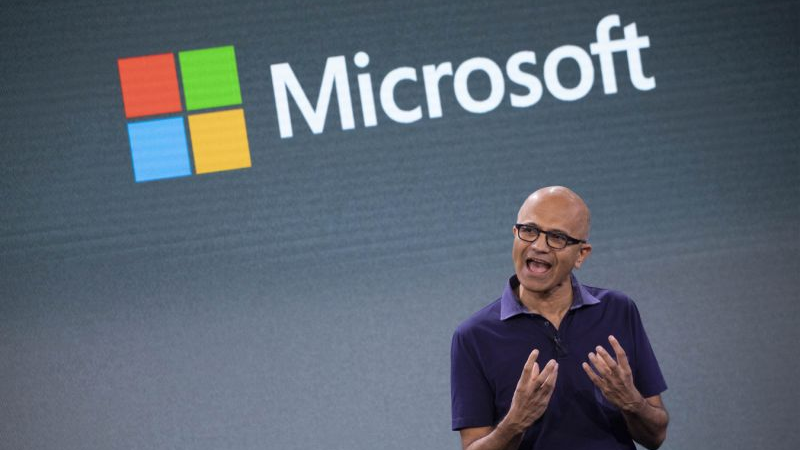Editor's note: Matteo Giovannini is a finance professional at the Industrial and Commercial Bank of China in Beijing and a member of the China Task Force at the Italian Ministry of Economic Development. The article reflects the author's views, and not necessarily those of CGTN.
The ongoing tech war between the United States and China, which is at the heart of contemporary geopolitics, can be well represented by what is happening recently around the case of Chinese-owned TikTok, a video-sharing social network service popular among millennials that has rapidly risen to prominence during the COVID-19 pandemic by hitting two billion downloads worldwide.
The U.S. administration, after having targeted for months Huawei and charged its CFO Meng Wanzhou, is now putting under the spotlight ByteDance's TikTok app in the United States in large part due to its unexpected rise in popularity among American citizens while explaining that it poses a risk for national security.
Microsoft is now exploring the acquisition of TikTok's operations in the U.S. in a deal valued at up to 50 billion U.S. dollars that from the one hand would give the software company a popular social-media service and on the other hand would help to relieve the U.S. government pressure on ByteDance, the Chinese owner of the video-sharing app.
The announcement was followed by the U.S. President Donald Trump's declaration that he would immediately sign an executive order to ban TikTok in the United States, that would pull it from the app store of Apple and Google, in a clear attempt to put pressure on the Chinese side of the negotiation table.
It is unquestionable that the only real "fault" of TikTok and of its parent company ByteDance is to be one of the few Chinese companies able to become in such a short period of time a global conglomerate and a serious competitor to the supremacy of U.S. titans such as Google and Facebook in the battle of our century, the social network dominance.
In order to better understand this point it should be underlined that TikTok is only the tip of the iceberg of a much wider political and economic war between the worlds' two largest economies started with Huawei and that will continue in future with other similar cases when other successful Chinese tech firms will rise to prominence.
TikTok had already previously demonstrated its commitment to follow U.S. laws by allowing experts to scrutinize its policies and inspect its algorithms' code as well as appointing an American citizen, the former Walt Disney executive Kevin Mayer, as CEO of U.S. operations.
Following the threat of a possible ban of the video-sharing app in a pure negotiating tactic from the U.S. administration, ByteDance has agreed to fully divest the U.S. business of TikTok in order to strike a deal with the White House that had previously rejected the possibility that the Chinese company maintained a minority stake in it.
Finding a common ground between the world's two most powerful nations is of paramount importance at a time of economic recovery after the coronavirus outbreak and the eventuality of continuous stubbornness and refusal to cooperate of the United States' administration would inevitable provoke a retaliation against American companies doing business in China in a never ending downward spiral.

Microsoft CEO Satya Nadella talks during a company event, in New York, the U.S., October 2, 2019. /AP
Microsoft CEO Satya Nadella talks during a company event, in New York, the U.S., October 2, 2019. /AP
There is a series of reasons to explain why the opportunity that Microsoft could play the white knight's role in this difficult negotiation is the best scenario.
Firstly, Microsoft has a historically good relationship with China that has built up through a series of good gestures and cooperation made to improve the relations over the years and this is probably one of the key reasons why China has accepted to step back and agree to divest the full stake in TikTok.
Secondly, the software giant has a solid balance sheet that is the result of the transformation of the company's culture and of the strategic reorganization operated by the CEO Satya Nadella and is now able to make an acquisition of such entity without the complications that a large number of small investors in a syndication-like acquisition would involve.
Lastly, it is positive even in terms of antitrust rules since the combination of Microsoft and TikTok would create a serious competitor to Google and Facebook in the highly prized U.S. digital advertising market and at the same time Microsoft would extend its portfolio by integrating TikTok with the already owned Bing search engine, as well as with the Xbox gaming, the cloud service and the professional platform LinkedIn.
It is also important from a political point of view because by maintaining in business a company of the relevance of TikTok, the United States would from the one hand preserve its global reputation as an open and free economy and from the other hand it would guarantee the employment of a large number of American engineers that work for the company, as in few months Americans will head to the polling places to vote for the next U.S. President.
The deal with Microsoft would be welcomed even from China's side since it would extract ByteDance, a highly growing national tech company, from the political war with the U.S. and thus able to focus on its overseas expansion without incurring in sanctions or external interference at a time of pressure on revenues caused by the already enforced ban of Chinese tech firms in India, TikTok's biggest market.
In this sense, the possible agreement between Microsoft and TikTok represents at the moment the best solution to the geopolitical frictions among the two superpowers and also a test to verify the willingness to cooperate on a common field and in the interest of every stakeholder without being guided by prejudice.
(If you want to contribute and have specific expertise, please contact us at opinions@cgtn.com.)